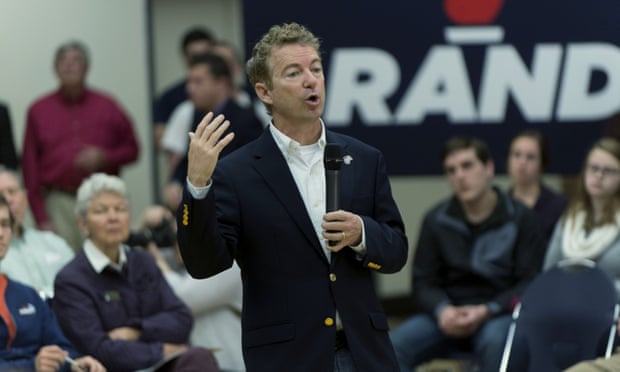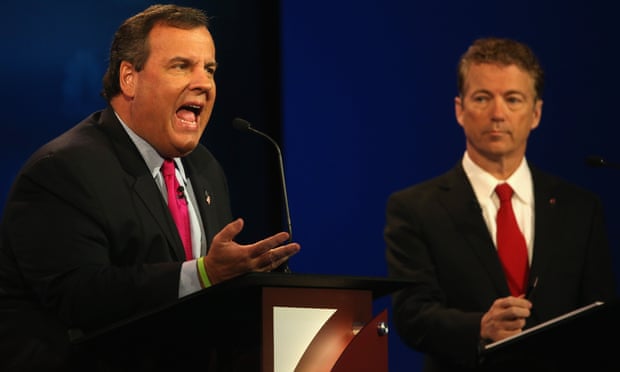In 2014, Time magazine called Rand Paul “the most interesting man in politics”. One year later, Republican voters do not seem to agree.
While Donald Trump hosts Saturday Night Live and Ben Carson’s autobiographyis parsed with Talmudic scrutiny, Paul, suffering from anemic poll numbers, only just escaped being bounced from Tuesday’s primetime Republican debate in Milwaukee.
He is undeterred. Asked by the Guardian at a recent campaign stop if he was still the most interesting man in politics, the Kentucky senator said: “I still am. I still am.”
For many Republican primary voters, the question is whether the unassuming if somewhat gruff Paul – who insisted on no mayo in the ham and cheese sandwich he ordered for lunch – ever was particularly interesting, or if voters were only attracted to the idiosyncratic, 21st-century libertarianism he expounds.
Paul must find a way to show such people that a substantive platform under which the right to bear arms is just as sacred as preventing government intrusions on privacy can compete with the “bombast” of Trump.
Paul spent Friday making two South Carolina campaign stops and doing innumerable interviews ahead of the Democratic presidential forum that was held in the state that night. Preaching a familiar message of fiscal restraint, he repeatedly told voters: “There is no free lunch.” At a sandwich shop which offered free food for any visiting presidential candidate, he pointedly paid for his meal.
The ardor of Paul’s hardcore supporters remained. Some had driven hours to see him and he was not met with just the usual requests for selfies – he was also asked to sign items ranging from a pocket constitution to an American flag. But though he was affable with his public, in conversation with the press, the Kentucky senator seemed frustrated by the media’s obsession with polls – which he said had led directly to the rise of Trump and Carson.
Paul told the Guardian: “I truly don’t believe either one will be the nominee. In fact, when you talk to most people who think they know something about politics, that’s what everyone is saying.”
He insisted that polls showing the two way ahead of the field were not very accurate, and cited as evidence his own state’s gubernatorial election on Tuesday, which the Republican Matt Bevin won by eight points after being down roughly five points on the eve of the vote.
Paul said polls became part of “a self-reinforcing news cycle because of the celebrity nature that goes on, on and on”, though he accepted that voters might “at a superficial level be attracted to bombast, insults, junior high sort of lobbing of verbal bombs that kind of stuff”. When election day came, he said, they would take a serious approach.
He clearly took a more charitable view of Carson than of Trump. Initially, when asked about the controversy over Carson’s claim to have been offered a scholarship at West Point, Paul declined comment. He eventually told MSNBC the situation was “a misunderstanding” which did not diminish Carson’s integrity.
In contrast, he had substantive ideological concerns about Trump – who, elsewhere, he has called “a clown”.
“The problem with Trump,” Paul said, “is that he thinks he can do anything if you give him the power to do it, and that’s sort of foreign to most of us who come from a limited government tradition.
“I wouldn’t want a friend to have absolute authority. I wouldn’t want anyone to have authority over me. So the idea of a benevolent dictator is not my cup of tea.”
He conceded that Trump’s rise had affected his standing with voters. Discussing changes in polling over the past few months – the days when Paul won pollsregarding likely Republican presidential candidates are long gone – he said: “The only thing that’s probably true because it looks that way is: as Trump’s numbers went up, my numbers went down.”
This, he said, had happened “before any of the debates. All that happened around June or July and so really for our numbers to change dramatically, if you believe the polls, Trump’s gotta come down.”
On the campaign trail, Paul’s contrast with Trump was pronounced. Instead of promising “so much winning your head will spin”, as the real estate billionaire is wont to do, Paul warned: “When someone offers you something for free, treat them like a drug dealer and run away.”
He offered no magic bullets, just simple adherence to his view of the constitution and that fundamental belief in fiscal restraint.
The difference was even to be seen in the names he decided to drop. Trump is prone to mentioning NBC executives by name; Paul made offhand references to law school professors, from the conservative iconoclast Randy Barnett to the liberal civil rights activist Michelle Alexander.
His supporters held out hope of a comeback. Nicole Long, who was wearing a red Rand Paul T-shirt, had driven more than two hours from Statesville, North Carolina to a fast food restaurant in Spartanburg, South Carolina. She said Paul was the reason she had become active in politics.
Her awakening began, she said, “when he started filibustering about the NSA and he really just got up there made it known that he wasn’t going to support Obama’s plans”.
She thought people were starting to realize that “Rand has substance, Rand has a message and Trump doesn’t really have that”.
There was skepticism toward Carson, too. David Shipp, of Hendersonville, North Carolina, told the Guardian with disgust that Carson wanted “to enforce inoculation for everybody”.
“It’s totally unconstitutional,” he said.
Mick Mulvaney, a South Carolina congressman who has endorsed Paul and was travelling with him, echoed such thinking. “It comes down to Rand and Ted Cruz for that non-establishment vote,” he said.
“People don’t even know what Ben Carson stands for. They think they like him but they don’t know. They don’t know what Donald Trump stands for, and when that filters through I think you will see a lot different results.”
Paul, therefore, keeps trucking, confident his campaign will overcome not just Trump and Carson but also Vermont senator Bernie Sanders, the self-declared socialist running for the Democratic nomination who is his chief rival among college students. Jokingly, Paul described Sanders’ platform as “free pot and free college”.
Asked about his campaign, and whether it could be improved, he said: “I give the same speech I gave four years ago, with a little bit of variety. But I’m not a believer that really we’re doing anything wrong or made a misstep.
“All the stories that say: ‘Oh, his campaign sucks, that’s why he’s doing poorly’ … not really. It has nothing to do with my campaign. It has nothing to do with me, really. It may mean people are liking the more bombastic message, but that’s just not me.
“I’m giving the same message as when I was higher in the polls.”


0 comments:
Post a Comment